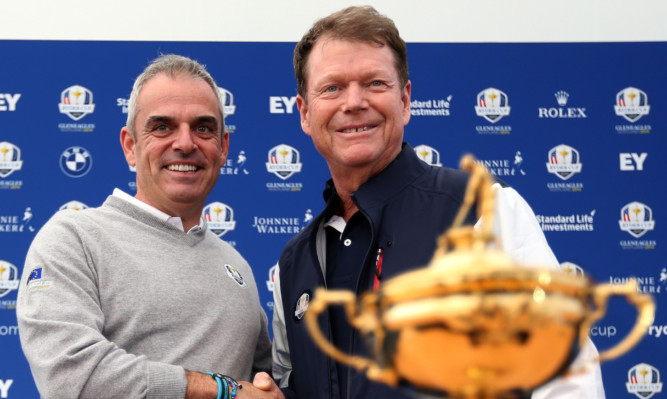Tom Watson knows a bit about intimidation and competitiveness, and he came out with all guns blazing as the teams finally arrived at Gleneagles for the 40th Ryder Cup.
The veteran American, skippering the USA for the second time having piloted his team to the Cup at the Belfry in 1993 the last time the US won away from home, set his stall out early.
This is the “redemption trip” for the Americans, to make amends for the embarrassing collapse last time, where seven of his team played in Europe’s Miracle at Medinah.
Ian Poulter, the talisman of Europe that weekend and main man in the last three Ryder Cups, is the clear target for them to take down.
Tiger Woods’ “spirit” of competitive fire is in the American team.
And although Watson who won four of his five Open championships in Scotland and said he feels “part-Scottish” is held in higher esteem than almost any one person from his country in this country, he expects no support whatsoever from the Scottish galleries this week.
“Not in the least,” he said when asked if his undoubted affinity with Scotland meant he could expect an easy ride from the crowd.
“This is what makes the Ryder Cup so great, the partisan nature of it, the singing and the cheering.
“I told the players coming over here for the first time you will feel the electricity. Even when you’re not on the course you’ll hear it. I told them, you’re going to experience something that you’ve never felt before.
“This is not like playing the Ryder Cup anywhere. We couldn’t be anywhere but in Scotland this week.
“This is a special place. I’ve done well here and feel an affinity with the place, a certain element in me feels part-Scottish in some ways. But the Ryder Cup is different.
“I remember my first match in 1977 at Lytham, I missed a putt and the crowd cheered. I’d never heard that before. It was then I truly understood the nature of the Ryder Cup, and it’s fine, it’s fair, it’s what you expect.”
Called in at the personal intervention of PGA of America president Ted Bishop to right the American ship that was floundering after Medinah, Watson admits that 1993 was as nervous as he’s been involved in golf.
“When you don’t have any real effect on the outcome, that’s pressure,” he said.
“But I made very clear to the players, this is a redemption trip. For the seven guys on that team, it’s time to make amends and try to redeem yourself for what happened in 2012.
“I think it’s a motivation rather than a negative.”
Although without Tiger Woods, Watson still feels he is with the team.
“I said right from the beginning, I would love to have Tiger on the team,” he continued.
“He brings an element of intimidation, great play and competitive spirit. Even though he’s not on the team, he’s here in spirit.”
Asked whether he saw world No 1 Rory McIlroy or the Ryder Cup specialist Ian Poulter highest points scorer on both teams for three successive matches as the biggest threat, Watson was quite unequivocal.
“We’re got a lot of players to look at,” he said.
“Whenever you beat the stud on the opposing team, that gives your team a boost, no question. But when there are 12 guys out there trying to win a point in each match…. Basically all you have to do is win a point and half each, and you win the Ryder Cup.
“But Poulter, I think with his record, he’s 80% victor over the series of matches he’s played in. We’d like to reduce that.”
Although a traditionalist, Watson likes the attitude of his young players, notably Rickie Fowler, whose preparation before leaving his homeland involved a haircut with “USA” cut into the side of his scalp.
He said: “Hey, if Ted Bishop thought that
cutting USA on the side of his head would help us win, he’d do it. This event is special in the world of sport, and I love it.”
